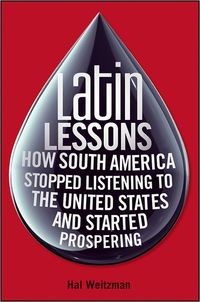

Purchase
How South America Stopped Listening to the United States and Started Prospering
Wiley
February 2012
On Sale: February 7, 2012
288 pages
ISBN: 0470481919
EAN: 9780470481912
Kindle: B006PW2TZG
Hardcover / e-Book
Add to Wish List
Non-Fiction
The mistakes the United States has made in Latin America—and
the high price it will pay for them Could it be that for the first time in history, the United
States needs Latin America more than the other way round?
Since the early 1800s, the United States regarded the region
as its “backyard,” but in the past decade South America’s
leaders have increasingly snubbed US efforts to persuade
them to adopt free-market economics and sign trade
agreements. While Washington has been distracted by military
campaigns elsewhere, rivals such as China, Russia, and Iran
have expanded their clout in Latin America, and US influence
in the region has fallen to a historic low—at the very time
that the United States has become more dependent than ever
on exporting to Latin America and importing its oil.
Combining sharp wit and great storytelling with trenchant
analysis, Hal Weitzman examines how America “lost the South”
and argues that if the United States is to find a new role
in a world of emerging superpowers, it must reengage with
Latin America. Charts the rise of resource nationalism—in which
governments take increasing control of natural resources and
squeeze multinational corporations—in South America and
across the world
Illustrates analytical points with vivid stories—such as
the disappearance of the Panama hat or the sweater Evo
Morales wore throughout a world tour—and interviews with
presidents, policymakers, and protesters
Written by a Financial Times journalist who formerly
served as its Andes correspondent based in Lima, Peru
Comments
No comments posted.
Registered users may leave comments.
Log in or register now!
| 


 © 2003-2025 off-the-edge.net
all rights reserved Privacy Policy
© 2003-2025 off-the-edge.net
all rights reserved Privacy Policy